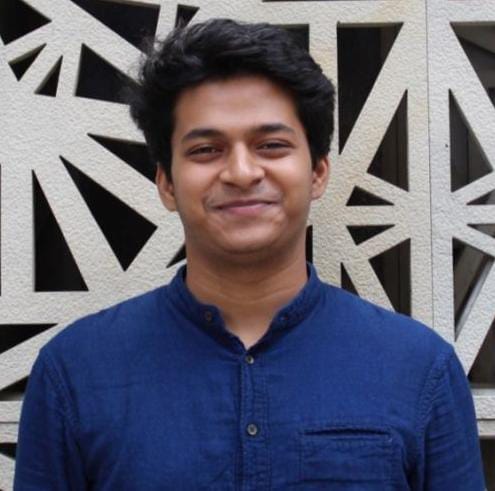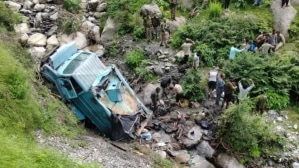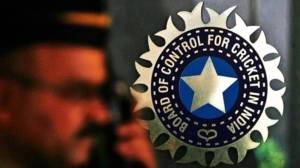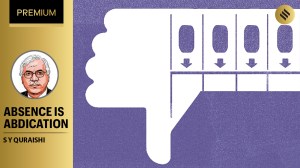For farmers in Delhi’s Jharoda Kalan, biggest grievance this election — laws curbing use and sale of agricultural land
The issue of the non-expansion of residential land is linked to the laws, as per locals. The Lal Dora land, marked for habitation, was last demarcated in 1952 in Jharoda, according to Sunil Dagar, another farmer. “If we build a room, it is vested in the Gram Sabha,” says Sunil.
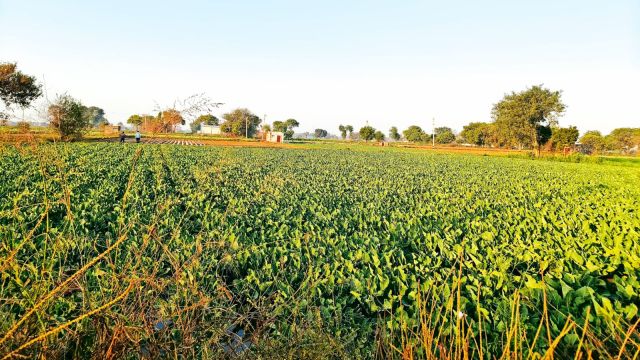 Jharoda Kalan shares a border with Haryana. Express photo
Jharoda Kalan shares a border with Haryana. Express photoLaws restricting sale and use of agricultural land, no shops in Delhi to offer subsidies on fertilisers, costly power supply, and tubewell connections: These are among the challenges facing the farming community in Jharoda Kalan, which forms a majority of the population in the village in Delhi that shares a border with Haryana. As the village gears up to vote in the February 5 Assembly elections, an anti-incumbency wave prevails even as the AAP government had earlier blamed the BJP-led Centre for not amending the laws which are among the biggest grievances of the farmers.
“Har fasal ek satta hai (Sowing crops each time is a bet),” says an exasperated Rohtash Singh Dagar, a 73-year-old farmer who grows cauliflower in 1 acre of land. Most farmers in Jharoda Kalan — which has an estimated population of over 10,000 — are small landowners like Dagar. Most landholdings are small, ranging from 1 to 3 acres.
The biggest issue facing farmers, according to locals, is the restriction on the use and sale of agricultural land under Sections 33 and 81 of the Delhi Land Reforms Act of 1954. To ensure agricultural holdings are not fragmented into sizes that are uneconomical for farming, Section 33 prohibits the sale, gift, or transfer of agricultural land such that the transaction leaves the owner with less than 8 acres. Section 81, on the other hand, states that a landowner will be ejected “for using land for any purpose other than a purpose connected with agriculture, horticulture or animal husbandry, which includes pisciculture and poultry farming…” Such land will be vested in the Gram Sabha, the law states.
“Dehat mein jitna dukh iska hai, utna kisi ka nahi hai (This is the biggest problem in Delhi’s rural area, it causes the most grievances),” he says. “If someone has a house of 100 yards, and has four children, then where will those children live? Even if I keep a brick here, policemen will harass me for money,” he adds.
Repeal of Sections 33 and 81 have been among the long-standing demands of Delhi’s landowners. These sections came under the spotlight recently when former Delhi CM and AAP chief Arvind Kejriwal alleged in a press conference that PM Narendra Modi had not fulfilled his promise to repeal the laws. The BJP had also promised during the 2020 Assembly polls that the laws would be scrapped with the help of the Centre.
The issue of the non-expansion of residential land is linked to the laws, as per locals. The Lal Dora land, marked for habitation, was last demarcated in 1952 in Jharoda, according to Sunil Dagar, another farmer. “If we build a room, it is vested in the Gram Sabha,” says Sunil.
Both these issues together result in a situation where building small structures for farm labour or cattle even becomes impossible legally, locals claim. Farmers have to pay local authorities to build even residential space for themselves.
Furthermore, despite proximity to Haryana, farmers say they can’t buy subsidised fertilisers from the state. “There are no government shops for seeds and fertilisers in Delhi. We can’t buy it from across the border in Haryana because they ask for an Aadhaar Card that has a Haryana address… so we have to buy it in black from private shops in Delhi. A sack of DAP costs Rs 1,800, compared to Rs 1,300 in Haryana,” says Kartar Singh, a retired MCD employee who also owns agricultural land.
“When Kejriwal came to power, he said he would provide these things, but nothing happened,” another farmer chimes in. “There is no subsidy for any kind on tractors, seeds, fertilisers or pesticides,” says Mahesh Dagar, (30) pradhan of the village.
The anger against the Kejriwal government is palpable. Jharoda Kalan falls in the Najafgarh Assembly constituency where Kailash Gahlot was elected in the last two elections. After leaving the AAP and joining the BJP last year, Gahlot is contesting from Bijwasan this time.
“In the last 10 years, they (the government) have stopped giving agricultural connections to us, they instead give us commercial electric connections. An agriculture connection gets a bill once in six months. But under a commercial connection, we get a monthly bill,” Kartar Singh says.
The Delhi Economic Survey 2023-24 flags a reduction in agriculture area in Delhi and cites fast urbanisation and shift in occupational patterns as the reasons, especially during the last two decades. In Jharoda Kalan, villagers estimate that only 50% of the next generation is involved in agriculture.

